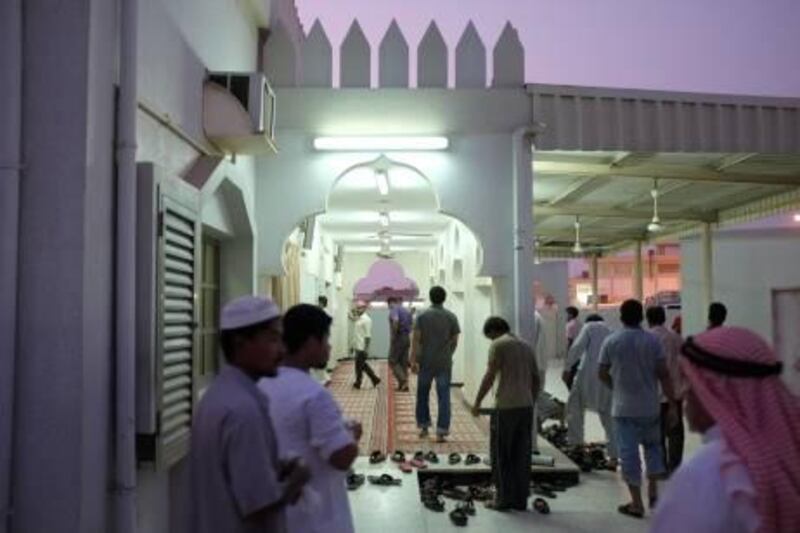RAS AL KHAIMAH // The mix of worshippers at Sheikha Jaziah Al Sabah mosque is a reflection of the eclectic neighbourhood of Mamourah that surrounds it.
Its bulbous minarets are dwarfed by loudspeakers that strain to push the call to prayer over the din of pigeon keepers, fish hawkers and carpenters sawing SpongeBob SquarePants-shaped bed frames.
Residents say the mosque was built before the mayhem, in the 1960s, when the neighbourhood was the sole preserve of fishermen and areesh houses.
The mosque matured with the neighbourhood. Residents say the current building - erected beside the old one about 15 years ago with a pillared hall and Mughal-inspired minarets - can hold 300 worshippers.
The old mosque, which held only 30 worshippers, was converted into the imam's house. In 1978, the imam's house became a cafeteria.
Abdul Kalam, 27, took over when his father died 10 years ago and runs Al Badr restaurant with his younger brother, Mohammed.
Mr Kalam knows that prayer makes people hungry. "On Fridays the streets are full all the way to this shop, people pray on the street," Mr Kalam said. "First they go to the masjid, then they come to the restaurant. When I go to the masjid I give thanks for Muslims."
His cafeteria closes five times a day for prayer and donates thousands of samosas and pakoras to the mosque during Ramadan. During the rest of the year business begins after fajr prayer but in Ramadan the shop becomes nocturnal, serving from 4pm until 3am.
Neither Mr Kalam nor any of his long-standing patrons know about the mysterious Sheikha Jaziah, the mosque's first patron. Yet none are surprised that a Kuwaiti royal would have donated here.
In the 1960s, before the UAE was formed, Kuwait was already investing in RAK's teachers, hospitals and, of course, mosques.
"The tribes with RAK had a strong connection," said Ali Al Mehry, a resident. "Before, 30 years ago, RAK was not developed as it is now. Sheikha Jaziah visited RAK and she saw that."
The mosque has enjoyed new popularity this year, thanks to an enormous iftar tent set up by the Zayed Bin Sultan Al Nahyan Charitable and Humanitarian Foundation.
Every night, volunteers serve fruit, laban, water and 50 huge platters of biryani to 230 workers. The cooks, visibly exhausted after a day of fasting and cooking, pour out the biryani with enormous ladles. They begin work at 6am and their shift does not end until every man is seated in front of a pile of rice.
Some lower income families park their cars outside the tent, and their children run in for plates of takeaway.
Shortly after the call to prayer, the shoes and their owners migrate en masse from the iftar tent to the mosque.
As the prayers begin, Emirati men and boys come from the dark streets into the mosque through the back door. Fishermen, some nearly blind, arrive clutching canes. Elderly men are in wheelchairs, escorted by their sons. Boys arrive early, teenagers run in late.
"God said we must help the poor," said Mahmoud Al Heshmi, 23, an Emirati volunteer who comes to the tent with his brother Abdulla.
The imam nodded his head. "All people in Ramadan learn ethics, education and patience," said Sheikh Hosni Husseini, 41.
Saleh Al Mehry, 60, knows the importance of charity. He can usually be found sipping sweet cardamom tea after evening prayers at Al Badr cafeteria. His life was not always such a treat.
Mr Al Mehry worked as a pearl diver and fisherman on Yemen's Socotra island, and as a waiter at a Lebanese restaurant in Bahrain before he settled in Mamourah to work for the electricity department in 1969.
Asked about charity, he says: "It is from God, it purifies. Whenever I found poor people who had no work I gave them zakat."
And when others ask what Ramadan means, he does not hesitate.
"Eating! Rice. Food. What else?"
"Nothing else?" asked his neighbour. "Prayers? Taraweeh?"
"Oh right, that too," he said.
@ For more on RAMADAN visit thenational.ae/topics






